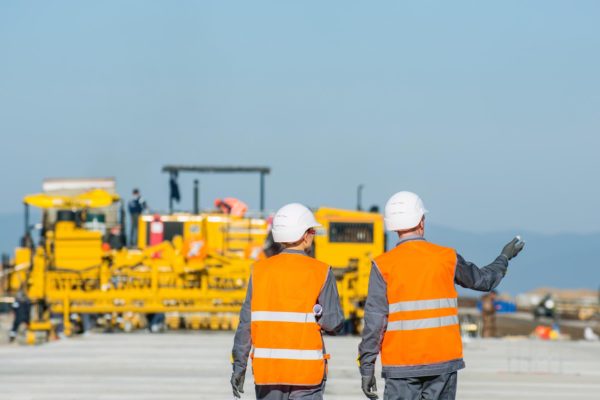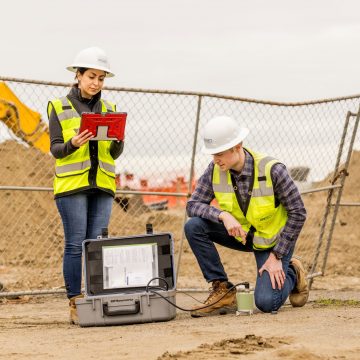Why Working With a Geo Tech Engineer is Crucial for Complex Construction Tasks
Wiki Article
The Interdisciplinary Approaches in the Geotechnical Sector: Bridging the Gap In Between Design, Geology, and Environmental Scientific Research for Optimum Job Results
The combination of design, geology, and ecological science within the geotechnical sector is not merely beneficial; it is critical for accomplishing ideal project outcomes. What approaches might arise to facilitate this essential cooperation and improve the efficiency of geotechnical methods?Importance of Interdisciplinary Collaboration
The importance of interdisciplinary collaboration in the geotechnical market can not be overstated. Reliable geotechnical tasks require the combination of diverse experience from various fields, consisting of design, geology, and environmental scientific research. This cooperation makes sure that all aspects of a project are thought about, bring about detailed options that deal with complicated obstacles.When working in seclusion,Interdisciplinary cooperation fosters development by enabling professionals to share understandings and approaches that might not be obvious. By leveraging the staminas of several disciplines, groups can identify possible dangers, enhance layout processes, and enhance the sustainability of geotechnical tasks. Such cooperation promotes an alternative understanding of site-specific conditions, which is crucial for exact evaluation and decision-making.
The complexity of geotechnical tasks requires a collaborated method to analytic. When designers, rock hounds, and ecological researchers function with each other, they can create a natural technique that aligns technological demands with environmental considerations and regulatory compliance. This harmony not just improves job end results yet also adds to the long-term durability of facilities. Ultimately, interdisciplinary partnership is essential for advancing ideal methods and attaining quality in the geotechnical industry.
Trick Duties of Each Self-control
Collaboration among various self-controls is not just valuable; it is essential for the effective execution of geotechnical projects. Each discipline-- design, geology, and ecological scientific research-- plays an unique yet interconnected role that adds to project efficacy and sustainability.Geotechnical designers are mainly liable for making structures and making certain structural honesty. They examine soil and rock buildings to analyze load-bearing capabilities, providing essential information for secure construction practices. Their know-how allows the formulation of innovative services to complex obstacles.

Ecological scientists evaluate the prospective influences of building on environments and water resources. They conduct environmental evaluations and develop reduction approaches to minimize adverse results. By incorporating eco-friendly considerations, they ensure compliance with regulations and advertise sustainability throughout the project lifecycle.
Study of Effective Combination
Effective integration of geotechnical techniques can be exhibited through numerous study that highlight the efficiency of teamwork in attending to complicated design difficulties. One remarkable example is the construction of the Hong Kong-- Zhuhai-- Macau Bridge, where a collaborative approach including geotechnical engineering, geology, and environmental scientific research was vital. Designers and geologists worked in unison to assess the seabed conditions and optimize the structure layout, ensuring security and reducing ecological influence.An additional impactful situation is the renovation of slope security in the San Francisco Bay Location, where an interdisciplinary group incorporated geotechnical evaluation with ecological evaluations. By incorporating engineer of record hydrological studies and geological studies, the team successfully identified potential landslide dangers and carried out efficient mitigation procedures, boosting safety and security and sustainability.
Moreover, the redevelopment of Brownfield sites commonly needs a multidisciplinary technique. In one case in Chicago, cooperation amongst geotechnical designers, ecological scientists, and metropolitan organizers led to the effective removal of polluted dirt, enabling the safe makeover of the site into a neighborhood park. These study show that interdisciplinary cooperation not only addresses technical challenges but likewise fosters ingenious options that profit both jobs and areas.
Challenges in Multidisciplinary Projects

Moreover, working with schedules and operations among various groups can be problematic, especially when each technique has special task milestones and deliverables. This misalignment can cause hold-ups and increased expenses. The obstacle of resource appropriation also impends big; guaranteeing that specialized competence is offered at important points calls for cautious preparation and foresight.
Last but not least, regulative compliance presents one more significant obstacle. Each discipline might face various regulative structures, and lining up these requirements to satisfy he has a good point project purposes can be taxing and complicated. Attending to these challenges requires solid management and efficient communication approaches to foster partnership and make certain that multidisciplinary teams work cohesively in the direction of shared goals.
Future Trends in Geotechnical Practices
As the geotechnical market advances, arising patterns are improving techniques to address the difficulties faced in multidisciplinary tasks - geo tech engineer. One substantial trend is the enhanced integration of innovative technologies, such as man-made knowledge and artificial intelligence, right into geotechnical analysis and design. These technologies improve predictive modeling and threat analysis, enabling engineers to make even more informed choices throughout the job review lifecycle
Furthermore, the adoption of digital doubles and real-time surveillance systems is coming to be a lot more prevalent. These devices promote continuous assessment of dirt problems and architectural performance, permitting for prompt treatments when issues arise.
Final Thought
In verdict, the combination of engineering, geology, and ecological science is important for achieving ideal end results in the geotechnical sector. Effective situation research studies illustrate the advantages of this technique, while acknowledging the difficulties faced in multidisciplinary projects.The assimilation of design, geology, and environmental scientific research within the geotechnical sector is not simply beneficial; it is important for achieving optimal project end results. Efficient geotechnical tasks need the integration of diverse proficiency from numerous fields, consisting of engineering, geology, and ecological science.Browsing the intricacies of multidisciplinary tasks in the geotechnical market provides a number of significant difficulties.As the geotechnical market develops, arising fads are reshaping methods to address the challenges encountered in multidisciplinary tasks. Geotechnical engineers are increasingly teaming up with ecological scientists to make sure that tasks straighten with sustainability objectives and abide with regulatory requirements.
Report this wiki page